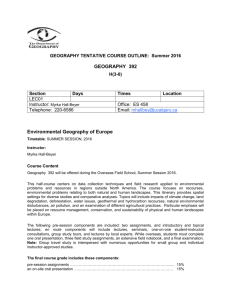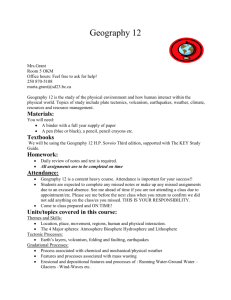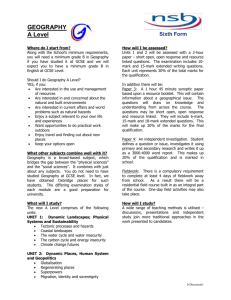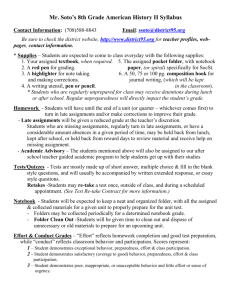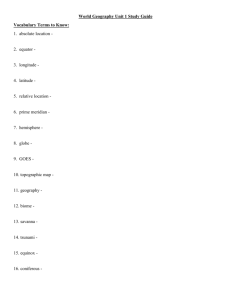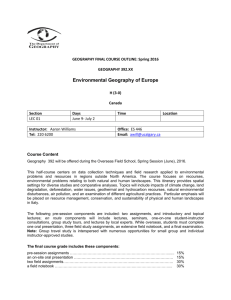International Field Work in Geography
advertisement
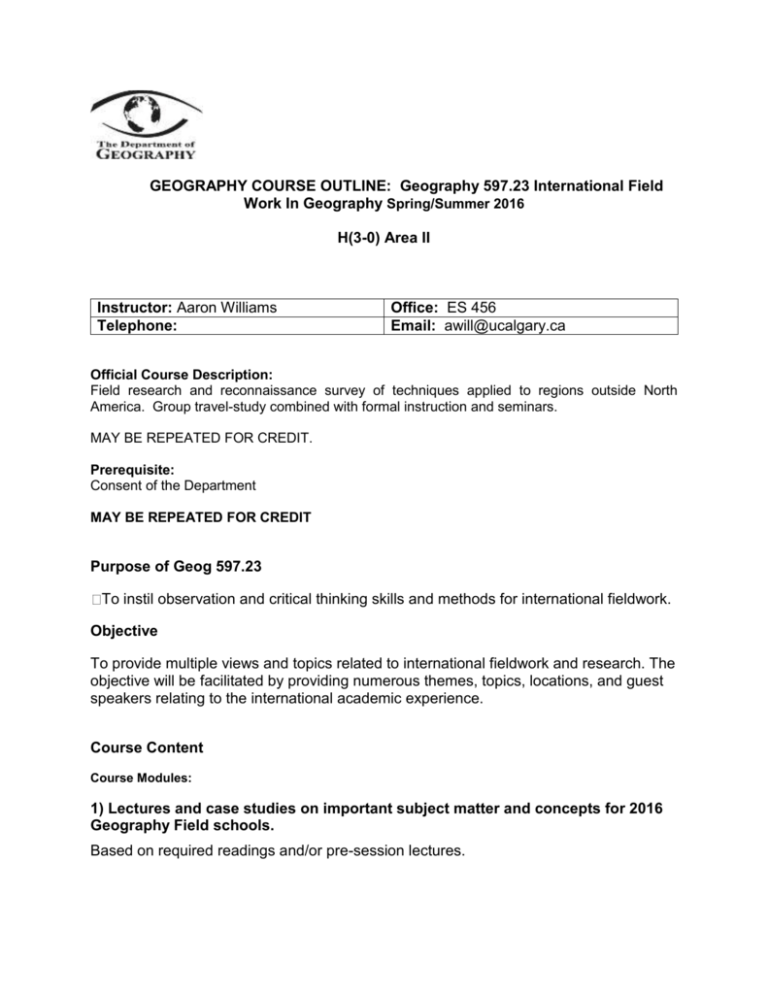
GEOGRAPHY COURSE OUTLINE: Geography 597.23 International Field Work In Geography Spring/Summer 2016 H(3-0) Area II Instructor: Aaron Williams Telephone: Office: ES 456 Email: awill@ucalgary.ca Official Course Description: Field research and reconnaissance survey of techniques applied to regions outside North America. Group travel-study combined with formal instruction and seminars. MAY BE REPEATED FOR CREDIT. Prerequisite: Consent of the Department MAY BE REPEATED FOR CREDIT Purpose of Geog 597.23 To instil observation and critical thinking skills and methods for international fieldwork. Objective To provide multiple views and topics related to international fieldwork and research. The objective will be facilitated by providing numerous themes, topics, locations, and guest speakers relating to the international academic experience. Course Content Course Modules: 1) Lectures and case studies on important subject matter and concepts for 2016 Geography Field schools. Based on required readings and/or pre-session lectures. 2) Introduction to critical observation and interpretation of human and physical landscapes. Academic skills essential for research, coursework and conducting fieldwork in a foreign environment. Site specific examples from select destinations on Geography field school program for 2016. 3) Travelling, Working, Researching: Cultural Interaction in Overseas Settings Geographic analyses and overviews of selected cultural realms: understanding worldviews, perceptions, misunderstandings, customs, and traditions; demographic, socio-economic and political change; flashpoints and disparities; environmental, social, and development issues; cultural sensitivity. Examples from numerous culture realms. Guest speaker from the Department of Geography. 4) Conducting Geographical Field Work Abroad. Qualitative and quantitative fieldwork methods and techniques in human and physical geography. Emphasis on methods which can be utilized while in international field settings. 5) The Impacts of International Tourism on Cultural and Physical Landscapes. Fragile ecosystems and environments: natural reserves and parks, wildlife reserves, and endangered plant and animal species. Impacts of tourism: economics, development, heritage sites, sustainability. A focus on the balance between the economic benefits, social and cultural effects, and the impacts on the environment. Two assignments will be assigned for the course. Topics from selected regions will include the following: environmental degradation, land use, housing, landscape change, and the impact of tourism Grading (Weighting) 40% ……………………. 2 assignments. 30% ……………………. Mid-Session Examination. Based on lecture material, required readings, and guest speakers. 30% ……………………. Final Examination. Based on lecture material, required readings, and guest speakers. It not essential to pass all elements to pass the course. Final exam in class. Blackboard: http://blackboard.ucalgary.ca/ Required Texts NA. References/Possible texts/Readings: Butler, D.R. ,Wilkerson, F.D. 2000. Comments: In Praise of Off-Season Field Trips, Journal of Geography 99: 6-42. Delyser, D., Starrs, P.F. 2001.Doing Fieldwork: Editor's Introduction, Geographical Review 91: 4-9. Hart, J.F. 1968. The Undergraduate Field Course: Field Training in Geography. Washington, D.C. Association of American Geographers, Commission on College Geography Teaching, Paper No, 1, 2904. Jenkins, A. 1994. Thirteen Ways of Doing Field Work with Large Classes, Journal of Geography in Higher Education 18: 143-154. Jones, P.A. (1969) Field Work in Geography, London: Longman's Green and Co. Ltd. Lounsbury, J.F., Aldrich, F.T. (1979) Introduction to Geographic Field Methods and Techniques, Columbus: Charles F. Merrill Publishing Company. Mayborn, K.R., Lesher, C.E. 2000. Teaching the Scientific Method Using Contemporary Research Topics as the Basis for Student-defined Projects, Journal of Geoscience Education 48: 145-149. Parsons, J.J. 1977., Geography as Exploration and Discovery. Annals of the Association of American Geographers 67(1): 1-16. Northon, C. 2001. Geography Undercover. Geographical Review, Vol, 91 Issue 1/2. Platt, R.S. (1959) Field Work in American Geography, Chicago: University of Chicago. Shoemaker, M.W. 2000. Russia, Eurasian States, and Eastern Europe. Harpers Ferry: Stryker-Post Publications. Robertson, I., Richards, P. 2003. Studying Cultural Landscapes London: Hodder Arnold Publishers. Rundstrom, R.A., Kenzer, M.S/. 1989. The Decline of Field Work in Human Geography, Professional Geographer 41(3): 294-303. Grading System: A+ 4.00 A Outstanding performance 4.00 Excellent-superior performance, showing comprehensive understanding of subject A- 3.70 B+ 3.30 B 3.00 Good - clearly above average performance BC+ C 2.70 2.30 2.00 Satisfactory performance – basic understanding of the subject C- 1.70 D+ D 1.30 1.00 Minimal Pass-marginal performance F 0 Fail - - poor performance For additional detailed course information posted by the Instructor on D2L Writing across the Curriculum Writing skills are not exclusive to English courses and, in fact, should cross all disciplines. The University supports the belief that throughout their University careers, students should be taught how to write well so that when they graduate their writing abilities will be far above the minimal standards required at entrance. Consistent with this belief, students are expected to do a substantial amount of writing in their University courses and, where appropriate, members of faculty can and should use writing and the grading thereof as a factor in the evaluation of student work. The services provided by the Writing Centre in the Effective Writing Office can be utilized by all undergraduate and graduate students who feel they require further assistance. Principles of Conduct The University of Calgary Calendar includes a statement on the Principles of conduct expected of all members of the University community (including students, faculty, administrators, any category of staff, practicum supervisors and volunteers) whether on or off the University’s property. This statement applies in all situations where the members of the University community are acting in their University capacities. All Members of the University Community have a responsibility to familiarize themselves with this statement which is available at: http://www.ucalgary.ca/pubs/calendar/current/j-2.html Plagiarism Academic dishonesty is not an acceptable activity at the University of Calgary and students are strongly advised to read the Student Misconduct section in the University Calendar. Quite often, students are unaware of what constitutes academic dishonesty or plagiarism. The most common are 1) presenting another student’s work as your own 2) presenting an author’s work or ideas as your own without proper referencing and 3) using work completed for another course. This activity will not be tolerated in this course and students conducting themselves in this manner will be dealt with according to the procedures outlined in the calendar. Disability Resource Centre Accommodations If you are a student with a documented disability who may require academic accommodation and have not registered with the Disability Resource Centre, please contact their office at 2208237. Students who have not registered with the Disability Resource Centre are not eligible for formal academic accommodation. You are also required to discuss your needs with your instructor no later than fourteen (14) days after the start of this course. Freedom of Information and Protection of Privacy FOIP: The Freedom of Information and Protection of Privacy (FOIP) legislation disallows the practice of having students retrieve assignments from a public place, e.g., outside instructor’s office, the department office, etc. Term assignments will be returned to students individually, during class or during the instructor’s office hours; if students are unable to pick up their assignments from the instructor, they provide the instructor with a stamped, self-addressed envelope to be used for the return of the assignment. Re: Posting of Grades and Picking-up of Assignments All assignments will be handles on D2L Their own grades will be available to each student on d2L by password access. Grades will not be available at Geography’s main office. Faculty of Arts Program Advising and Student Information Resources Have a question, but not sure where to start? The new Faculty of Arts Program Information Centre (PIC) is your information resource for everything in Arts! Drop in at SS110, call us at 403-220-3580 or email us at artsads@ucalgary.ca. You can also visit the Faculty of Arts website at http://arts.ucalgary.ca/undergraduate which has detailed information on common academic concerns. For program planning and advice, contact the Student Success Centre (formerly the Undergraduate programs Office) at (403) 220-5881 or visit them in their new space on the 3rd Floor of the Taylor Family Digital Library. For registration (add/drop/swap), paying fees and assistance with your Student Centre, contact Enrolment Services at (403) 210-ROCK [7625] or visit them at the MacKimmie Library Block. Contact for Students Union Representatives for the Faculty of Arts: arts1@su.ucalgary.ca, arts2@su.ucalgary.ca, arts3@su.ucalgary.ca, arts4@su.ucalgary.ca Re: Posting of Grades and Picking-up of Assignments All assignments will be handled through D2L or personally. Their own grades will be available to each student on D2L by password access. Grades will not be available at Geography’s main office.
